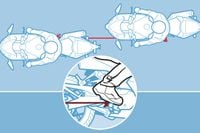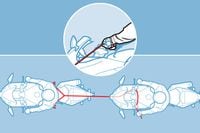Motorcycle give up the ghost while you’re out with your friends? Or maybe you just ran out of gas a couple of miles before the fuel stop?
First, get 12 feet to 20 feet (4 to 6 m) of rope, tie-downs hooked together, a bit of fence wire or phone cable, or best of all, a one inch (2.5 cm) wide flat nylon strap.
One method (above illustration) keeps the towline down low. On the lead bike, wrap the line once around the right footpeg (if the drivechain is on the left). The rider firmly holds the line in place with his foot. The rider being towed does the same thing using the opposite footpeg (left in our example). If the tow goes wrong, either rider can easily let go.
Another method (illustration below) starts with the line tied to the frame of the lead bike as high as possible. Alternately, make a “Y" in the end of the line and tie each end to a footpeg; the fork should rest in the center of the seat above. The end leads back to the trailing bike, and goes under the headlight, on the centerline of the bike. The loose end wraps around the handlebar once or twice, and is held by the left (clutch) hand. The towing rider operates the front brake normally, and if he needs to get free, he can simply let go.
Either way, the more experienced rider should be on the trailing bike, and should keep all the slack out of the line; the trailing rider can run over a slack line and get it caught up in the front wheel. All braking should be done by the trailing rider, and the lead rider should keep the speed down.


/cloudfront-us-east-1.images.arcpublishing.com/octane/VZEG2EJI2RDFZNHLRZMU56MD3Q.jpg)
/cloudfront-us-east-1.images.arcpublishing.com/octane/GVJQO5FFOFBWNGODOBRB4FBAW4.jpg)
/cloudfront-us-east-1.images.arcpublishing.com/octane/BIVAK2SFIBDJJM25E7I5VU2FJE.jpg)
/cloudfront-us-east-1.images.arcpublishing.com/octane/CH5VX52UG5CFHOVH5A6UYEFWWA.jpg)
/cloudfront-us-east-1.images.arcpublishing.com/octane/ZVGJNGZRU5C33N7KN23BBFKSC4.jpg)


/cloudfront-us-east-1.images.arcpublishing.com/octane/CZ5OM3E43ZEXJHY7LCYXCHLIKI.jpg)
/cloudfront-us-east-1.images.arcpublishing.com/octane/DF5T4K5KPZFJXFCTGPYR77PKJM.jpg)
/cloudfront-us-east-1.images.arcpublishing.com/octane/RMCT2KVQBJHBZMRTSLOVPMOILU.jpg)

/cloudfront-us-east-1.images.arcpublishing.com/octane/K45KB2XHQVA65DX7VN4ZSMT2BI.jpg)
/cloudfront-us-east-1.images.arcpublishing.com/octane/FNHXQQ56BRD7TO4YIJ453PNG2M.jpg)
/cloudfront-us-east-1.images.arcpublishing.com/octane/OIKJC4JA3ZH7BMKUGWYKBIY5FA.jpg)
/cloudfront-us-east-1.images.arcpublishing.com/octane/MT2SAEWY6FDXFBYSLDE3AEFDTM.jpg)
/cloudfront-us-east-1.images.arcpublishing.com/octane/66UPKPYVURBPRCP5HXSN56MEMM.jpg)
/cloudfront-us-east-1.images.arcpublishing.com/octane/EOREGDSRKFDCRJC6K3EDVHBGCE.jpg)
/cloudfront-us-east-1.images.arcpublishing.com/octane/42RF63Q3LVCMBP3DGTWXFYSMOA.jpg)
/cloudfront-us-east-1.images.arcpublishing.com/octane/XNVY3EVWZFCEVPUGJGAN633LXE.jpg)
/cloudfront-us-east-1.images.arcpublishing.com/octane/2PLTVHXY7FDSPFHKU5CFOC43ZY.jpg)
/cloudfront-us-east-1.images.arcpublishing.com/octane/B6M3WTRLFZGNXBEATNXPVGBBD4.jpg)
/cloudfront-us-east-1.images.arcpublishing.com/octane/4CMH3FI73BEM5D6MFYX42FLDSQ.jpg)
/cloudfront-us-east-1.images.arcpublishing.com/octane/RIHAPYNWU5H3XAOXNOPRWCBTQA.jpg)
/cloudfront-us-east-1.images.arcpublishing.com/octane/HU4NUBCL3VAFZA75VYRCMAUHVM.jpg)